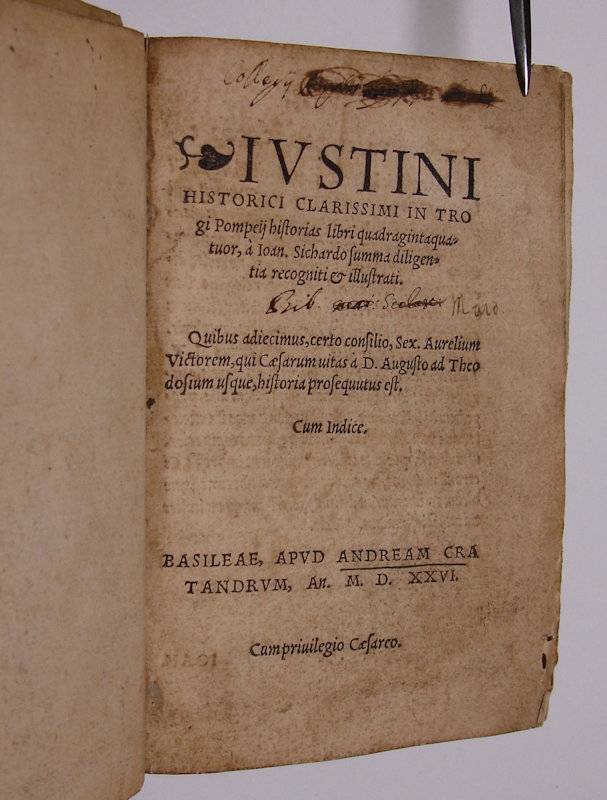JUSTINUS.
Iustini Historici Clarissimi In Trogi Pompeii historias libri quadragintaquatuor, a Ioan. Sichardo summa diligentia recogniti & illustrati. Quibus adiecimus, certo consilio, Sex. Aurelium Victorem, qui Caesarum vitas a D. Augusto ad Theodosium usque, historia prosequutus est. Cum indice.
Basel (Basileae), Apud Andream Cratandrum, 1526. Cum privilegio Caesareo. (Colophon at the end: 'Basileae, per Andream Cratandrum, Mense Ianuario, anno 1526')
8vo. (VIII),371,(41 index, errata, colophon) p. 20th century overlapping vellum 14.5 cm (
Ref: VD16 T 2050; Schweiger 2,487; Graesse 3,512; Ebert 11134) (
Details: Printed completely in italic letters. Woodcut printer's mark on the last page, it depicts an almost naked Fortuna with winged feet standing on a globe, which is divided in four parts; in her right hand she hold a opened razor blade, with her left hand she makes a gesture as if she wants to grab something; the back of her head is shaven bald, and the long lock in front is blown to the right; Fortuna stand in an architectural alcove. There is no motto. This variant of Cratander's printer's mark is not mentioned by A. Wolkenhauer, 'Zu schwer für Apoll, die Antike in humanistischen Druckerzeichen des 16. Jahrhunderts', Wiesbaden, 2002) (
Condition: Title dustsoiled, and showing a thumbed right edge. Two small holes in the right lower corner of the title. Old ownership entry at the top of the title erased. Old name on the title. Paper somewhat yellowing. Occasional old ink notes and underlinings; right margin cut rather short) (
Note: This is an epitome made by one Justinus, probably in the third century A.D., of the 'Historiae Philippicae' of the Augustan historian of Gaulish descent Pompeius Trogus, who got his nomen because his grandfather was given Roman citizenship by Pompeius after his campaign against Sertorius in Spain. Important parts of his 'Historiae', which numbered 44 books, only survive in this epitome of Justin, in which it was boiled down, it is estimated, to 1/10th or 1/6th. (Neue Pauly 10, p. 115) Trogus produced a universal history of the peoples outside Italy. He seems to have used no other sources than Greek historians, and his story runs from Ninus king of Assyria to the absorbtion of the other nations into the Roman empire, and the establishment of the 'Pax Augusta'. Books 7/12 describe the rise of Philip II and of Macedon. Books 13/40 treat the Hellenistic kingdoms. 42/42 contain the history of Parthia, 43 of Italy, and 44 the history of Spain. Inserted are many historical and geographical excursus, for example on the history of Armenia or the Jewish wars. The leading concept of Trogus' history was the so-called 'translatio imperii', which conceived history as a linear succession of empires under a singular ruler or emperor. The narrative is elaborate, dramatic and moralizing. Trogus was, according to Rose, an very passable stylist, who arranged his second hand material intelligently, and showed 'some original views how to write history. (...) Even in this diminished condition (the epitome) the history is interesting reading, often containing facts not to be met with elsewhere, and one of our much too scanty sources for the history of the eastern Mediterranean and the adjacent countries'. (H.J. Rose, 'A Handbook of Latin literature', 'London 1967, p. 312/13) The epitome of Justin was widely read in the Middle Ages, because it seemed to legitimize the 'translatio imperii' to the Pope, but also the emergence of the Holy Roman Empire, as legitimate continuation of the Roman Empire. (See for 'translatio imperii' English Wikipedia) After the Historiae Philippicae has been added the 'Vitae Caesarum' of the late antique Roman historian Aurelius Victor, biographies of Roman emperors from Augustus to Constantius (360 A.D). It treats biographical material in a moralizing fashion, and is based for the first emperors on Suetonius.
§ The German jurist Johannes Sichard, 1499-1552, was from 1535 till his death professor of Roman Law at the University of Tübingen. This representative of humanistic jurisprudence published on the Codex Iustinianus, but also some important legal texts of Germanic peoples, especially the 'Breviary of Alaric' (Breviarium Alaricianum) (1528), laws of the Ripuarian Franks, Alemanns and Bavarians (1530). He was also a legal counselor in lawsuits for the Dukes of Württemberg in their legal controversies with Ferdinand, king of the Holy Roman empire. This Justinus seems to have been his only edition of a Roman author. (ADB 34, 143/46) It was reissued by Cratander in 1530) (
Provenance: On the front flyleaf in pencil: '13 Oc. 1962', written by the Flemish linguist Walter Couvreur, 1914-1996, who was an Orientalist, and professor of Indoeuropean linguistics at the University of Gent. It indicates the date of aquisition. The place of acquisition he wrote on the flyleaf at the end: 'Luik, Halbart'. The ownership entries on the title are made illegible) (
Collation: a4, b-z8, A-C8, D6) (Photographs on request)
Book number: 120090 Euro 1250.00
Keywords: (Oude Druk), (Rare Books), Greek history, Justin, Justinus, Latin literature, Macedonia, Macedonian history, Pompeius Trogus, Roman history, Swiss imprints, alte Geschichte, ancient history, antike altertum antiquity, griechische Geschichte, römische Geschichte
 JUSTINUS.
JUSTINUS.